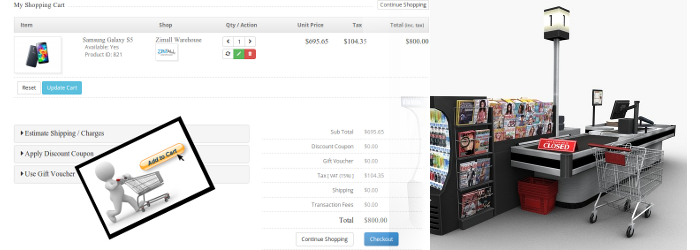|
View Cart Checkout empty cart |
Total
|
Add to Cart? Shopping Cart? Checkout? Whats this?
- 0
- 13 May 2014 03:39 pm
- Rational Ear

One of the challenges that e-retailers in Zimbabwe have to face is the lack of understanding by some of its consumers about how shopping online really works. Some times its not that they do not know how to shop online but rather, they have become so used to the local classifieds sites where they just go to check the product price and then go on to visit or call the supplier.
This tendency to just view and go has become the problem that local e-retailers have to solve, because at the end of the day, the whole convenience, shop from wherever picture they are trying to paint becomes blurry as no one is actually buying online but rather, just checking the prices and then driving all the way to shop.
With a few Zimbabweans trying to promote e-commerce, one of the issues they have to address is “the how it works” part.
“Add to cart”, “Buy Now”, “Shopping Cart”, “Checkout” are all relatively new terms that every new online shopper has to understand and learn how to use and when to use.
Some people are actually afraid of clicking the “Add to cart” button because they think that maybe they will be charged right away for doing that or that maybe an annoying sales agent will call you asking you all sorts of questions.
According to urbandictionary.com, “Add to cart” is:
an Internet Era phrase used to communicate one's intent of purchasing or engaging in something.
Online stores typically have customers construct before they pay a list of all the items they want to buy. This list is called a shopping cart, in analogy to real-life supermarket shopping carts, so the command to add an item to the list is typically "add to cart".
By extension, the phrase can be used to mean "I want it".
From my experience, “Add to cart” simply means adding an item to your shopping list and it can be said with all certainty that you will not be charged for that. “Buy Now” generally performs the same action as “Add to cart” although other sites may perform a different action like starting the “Checkout” process.
Also depending on the online store you are shopping from, in general, no one will call you asking you when you are going to pay for the items you have added to cart. However, some shops may call you to remind you that you have stuff in your cart and whether you would like to pay for them soon.
So this then brings us to the next issue, what happens after “Add to cart”. The online shopping process is generally the same across most platforms. The process is summarized into two general steps, the product selection step (“Add to cart”) and the buying step (“Checkout”).
Usually when you have made the “Add to cart” command, you are asked whether to “Checkout” or just continue shopping. “Checkout” in e-commerce means to place an order and sometimes pay for the items in your shopping cart. Its just like taking your selected items to the counter in a supermarket and paying for them.
However with online shopping, the “Checkout' process may involve collection of your contact details, determining the method of payment you are going to use and how you will receive your products. Depending on the site, this process may be very long and boring especially if you are a new user to the site but with some, they try to make the process as simple as possible.
Some online stores will require you to make a payment right away during the checkout process whereas in others, you can pay later after you have been issued with an invoice.
A "Shopping cart" as defined by businessdictionary.com:
Graphic representation of a supermarket shopping cart on a vendor's website which serves to keep the list of items a user (buyer) has 'picked up' from the online store. When the buyer is ready to 'check out,' he or she may go through the list to make a final purchase decision before clicking the 'buy' / 'checkout' button.
This pretty much sums up the whole how to buy online process for those who did not know how to do it.




Comments And Ratings
Article Rating
Leave A Comment
You need to login to comment